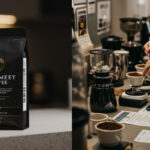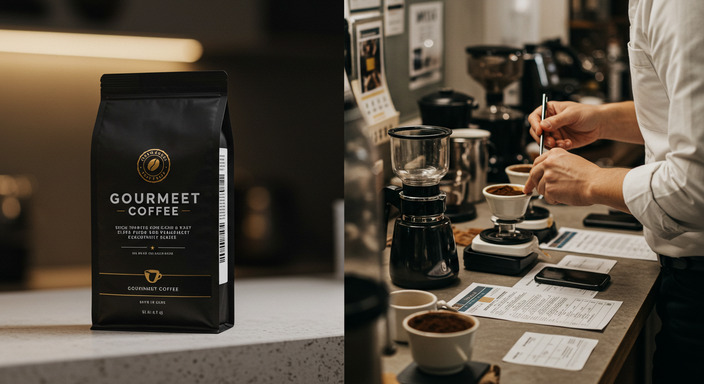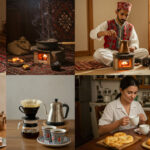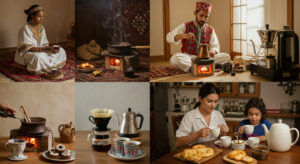
What makes it different from gourmet coffee?

Table of Contents
ToggleWhen you think of coffee, you might envision the simple, fragrant cup that kickstarts your morning. But have you ever stopped to ask yourself what differentiates your regular cup of coffee from its sophisticated cousin, gourmet coffee? While both beverages share the same roots, the distinction between them is a journey into the intricate world of coffee production, flavor profiles, and cultural nuances.
The Definition of Gourmet Coffee
At the heart of understanding gourmet coffee is its definition. Gourmet coffee is often associated with high-quality beans that are specifically cultivated, harvested, and processed to ensure superior taste. Such coffee is typically derived from Arabica beans, which account for about 60-70% of the world’s coffee production. These beans are known for their smoother, more complex flavors compared to the more robust and bitter Robusta beans.
| Characteristic | Gourmet Coffee | Regular Coffee |
|---|---|---|
| Bean Quality | High (Arabica) | Mixed (Arabica, Robusta) |
| Flavor Profile | Complex | Basic |
| Processing Method | Specialized | Standard |
| Price | Higher | Lower |
The production of gourmet coffee involves meticulous attention to detail, from the terroir and climate where the beans are grown to the precise methods used in their roasting.
Processing and Roasting Techniques
The journey from bean to cup involves critical steps in processing and roasting, which significantly impact the taste and quality of the coffee. Gourmet coffee is processed through either the wet method, where the fruit covering the beans is removed before drying, or the dry method, where the beans are dried with the residue of the coffee cherry intact. Each method imparts subtle differences in flavor, with the wet method often resulting in a cleaner taste.
Roasting also plays a pivotal role. Gourmet coffee beans are roasted with precision, often in small batches, to ensure consistency and retain the distinctive flavors of the beans. This artisanal approach contrasts with the mass roasting processes typical of regular coffee, which may sacrifice flavor complexity for efficiency.
The Role of Origin
The origin of coffee beans is a defining element of gourmet coffee. Single-origin coffees, often focused on in gourmet selections, are sourced from a specific location and each has a unique taste profile influenced by local climate, soil, and altitude. This contrasts with regular coffee, which is typically a blend of beans from different regions and is designed to produce a consistent, though less distinctive, flavor.
“Coffee is a language itself.” – Jackie Chan
The appreciation of single-origin coffees allows consumers to experience the diverse palettes offered by regions as varied as the highlands of Ethiopia, the volcanic terrain of Costa Rica, or the lush mountains of Colombia.
Coffee Brewing Methods
Brewing methods further accentuate the deviations between gourmet and regular coffee. While a drip coffee maker or instant coffee may suffice for regular coffee, gourmet coffee often involves more sophisticated apparatus like the French press, pour-over brewers, or espresso machines. Each brewing method extracts and highlights different flavor notes, aligning with the gourmet coffee consumer’s explorative palate.
In particular, methods such as cold brewing or aero pressing have gained popularity in the gourmet community, as they offer unique flavor experiences and highlight the subtle nuances of high-quality beans.
The Consumer Experience
The rise of the artisanal coffee shop has transformed how consumers engage with coffee. Gourmet coffee experiences involve not only savoring the final brew but also appreciating the journey and craftsmanship behind each cup. Coffee tastings, much like wine tastings, have become popular, where aficionados explore various beans’ aromas and flavors.
The service and ambiance of cafes specializing in gourmet coffee enrich the consumer experience, offering a community space for relaxation and conversation. The focus on quality and education in these venues distinguishes them from more transactional interactions at ordinary coffee chains.
Sustainability and Ethical Considerations
Gourmet coffee is often closely associated with sustainability and ethical sourcing. Direct trade and fair trade practices are more prevalent, where coffee buyers establish direct relationships with farmers, ensuring a fair price for beans and promoting sustainable agricultural practices. This contrasts with the mass production models typical of regular coffee, where traceability and fairness may not be prioritized.
Sustainability initiatives in the gourmet coffee sector extend to environmentally friendly packaging and efforts to reduce the carbon footprint of coffee production. These values resonate deeply with socially conscious consumers, who seek products that align with their environmental and ethical standards.
The Economics of Gourmet Coffee
The economics behind gourmet coffee also plays a key role in its distinction. With an emphasis on quality over quantity, gourmet coffee is naturally positioned at a higher price point. The premium price reflects the detailed care in bean selection, processing, roasting, and distribution, translating into a luxurious offering that appeals to discerning consumers.
Despite its higher cost, demand for gourmet coffee continues to rise, supported by a growing consumer awareness around quality and sustainability. Producers and retailers have adapted by offering various products, from high-end packaged beans to subscriptions that deliver the ultimate coffee experience directly to consumers’ homes.
Health Implications
While both gourmet and regular coffee offer health benefits, such as providing antioxidants and improving energy levels, gourmet coffee is often touted for additional advantages. The high-quality beans used in gourmet coffee are less likely to be contaminated with mold or mycotoxins, common in lower-grade beans, thus potentially offering a cleaner, healthier cup.
Furthermore, the emphasis on purity and the avoidance of added sugars and artificial flavors in gourmet preparations may be seen as healthier options, catering to consumers prioritizing wellness.
FAQ – Common Questions
What makes gourmet coffee more expensive?
Gourmet coffee is more expensive due to the high-quality beans, meticulous processing, and specialized roasting techniques involved, which ensure superior flavor and ethical sourcing.
Can I make gourmet coffee at home?
Yes, with the right equipment and ingredients, you can brew gourmet coffee at home. Investing in quality beans and a proper brewing device is key.
Is gourmet coffee better for the environment?
Generally, gourmet coffee is more environmentally friendly, as it often involves sustainable farming practices and ethically sourced beans.
How can I identify a good gourmet coffee?
Look for single-origin labels, Arabica beans, fair trade certification, and detailed information about the harvesting and roasting processes.
Does gourmet coffee have more caffeine than regular coffee?
Caffeine content in gourmet coffee isn’t necessarily higher; it largely depends on the type of beans used and the brewing method.
Is there a significant taste difference between regular and gourmet coffee?
Yes, gourmet coffee tends to have a more complex flavor profile due to its careful selection and processing, whereas regular coffee offers a more uniform taste.
Conclusion
Gourmet coffee distinguishes itself from regular coffee through a combination of superior bean quality, refined processing, and ethical considerations. This distinction is not merely about taste but also encompasses the broader experience of savoring a meticulous craft. The journey of gourmet coffee from farm to cup is a testament to the remarkable variety and depth that coffee, as a product and cultural cornerstone, can offer. As consumers increasingly seek quality and sustainability, gourmet coffee continues to thrive as a sophisticated indulgence that delivers on both fronts.
Meta Descrição: Discover the nuances of gourmet coffee and what sets it apart from regular brews. Explore flavors, origins, ethics, and the art behind every cup.
is a writer and editor at Coffee With Finance, blending her love for coffee, personal finance, and visual storytelling. She crafts engaging articles, curates site images, and shares brewing tips, bean origins, and practical money advice. Anna believes that managing finances, like making great coffee, should be intentional and rewarding — bringing clarity, warmth, and beauty to every story she tells.




























Post Comment